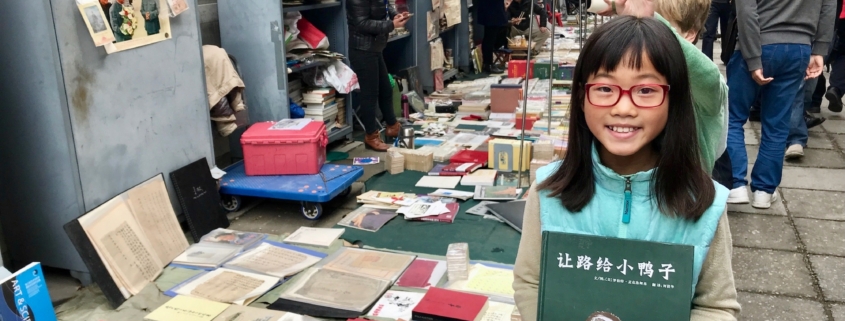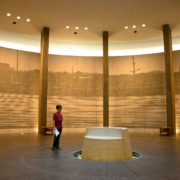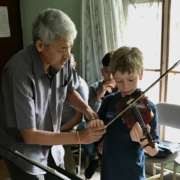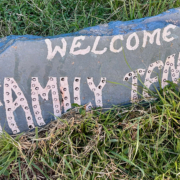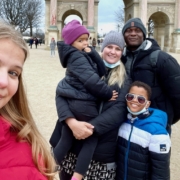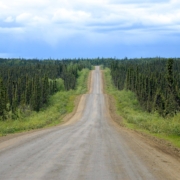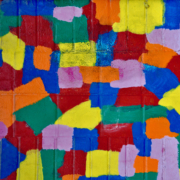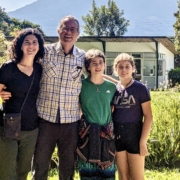What is Worldschooling?
In this post, we answer the question: what is worldschooling? Before diving into its philosophy and history, we will explain what the term worldschooling means and represents. We will also define common terms used in the worldschooling community.
What is worldschooling, anyway?
Simply put, worldschooling is learning through direct interaction with the world.
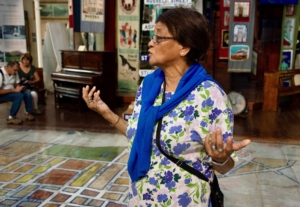
Learning about forced removals in Cape Town
Worldschooling is an educational approach shaped by the experience of learning in the world. Worldschooling is a form of education that combines travel and experiential learning. Rather than being confined to a traditional classroom setting, worldschooling families believe that real-world experiences, cultural immersion, and travel can provide rich educational opportunities.
Worldschooling allows children to learn about different cultures, languages, history, science, geography, and social dynamics by experiencing them firsthand. It often involves families traveling to other countries or regions, exploring local attractions, engaging with local communities, and participating in activities and experiences that enhance their learning. Worldschooling can happen anywhere, any season, any time of day. It just requires a little curiosity and a lot of wonder.
One of the limitations of classroom learning is that we tend to learn about others. With worldschooling, we begin to learn from others. It’s an exchange. Learners create their own opinions based on direct experiences rather than simply repeating what they hear from others or read in a textbook. You can’t fake a personal interaction. Your kids might reach the conclusion, for example, that countries maligned in the mainstream US media are full of good and kind people. Worldschooling is fact-finding; worldschooling is peacebuilding.
Worldschooling can be:
- learning to tap a rubber tree in Krabi, Thailand
- visiting WWII sites in Normandy, France to understand the legacies of those who battled
- sourcing ingredients and learning to cook kebabs with a hostel owner in Istanbul, Turkey
- taking the Junior Ranger pledge after completing educational activities at Dinosaur National Monument
- visiting the bridge on the ferry from Helsinki to Tallinn to learn about navigation equipment
- collecting river water in your neighborhood and looking at it under a microscope at your kitchen table
- calculating currency conversion to buy Uyghur currants at the Xinjiang market
- visiting with a Ski Patrol team in Colorado to learn how dogs become avalanche rescuers
- talking with your elderly neighbor about what life was like when she was a kid
- listening to an audiobook about the ancient Mayans while exploring the temple regions of Guatemala
- learning how to say hello, goodbye, please and thank you in a local language new to you
- drawing a picture and naming the phase of the moon every night for a month from your campsites
The possibilities are endless.
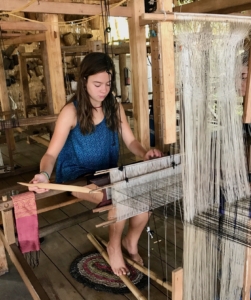
Learning to weave from local experts in Laos
Worldschooling varies in its ties to formal educational structures. Worldschooling can be closely aligned with unschooling (see below), theme-driven, subject-driven, or opportunistic based on where a family is traveling and what the day presents. It can also include online learning while on the road, with students completing tasks independently or connected with remote classmates.
Over the past couple of decades, the term worldschooling gained traction. Several traveling families who considered themselves worldschoolers brought awareness to the concept as they shared their experiences online and in popular media. You might also come across the term roadschooling. For clarity, here at Wonder Year we use the term worldschooling to mean it all. We want everyone to feel welcome whether you are traveling in the US or overseas, full-time or part-time, following a curriculum or going with the flow. This growing all-comers inclusivity around the term is also what we see reflected on the internet and social media.
Worldschooling is not something you sign up for. There’s no one to register with, no dogma or governing institution. There are many resources to help you design what worldschooling looks like for you and your family. We walk readers through many of them in our upcoming book, Wonder Year: A Guide to Long-Term Family Travel and Worldschooling.
What is Wonder Year?
A Wonder Year is a season of discovery. It is an experience of being in motion with your family and adopting a mindset of growth and curiosity. Not necessarily wedded to one year, the notion applies to any length of time–three weeks, three months or three years. For these reasons, it is also the name of our book.
Worldschooling is the educational foundation of a Wonder Year. Our belief is simply this—the world is a very good teacher, and the more interaction our children have with it through family travel, the more their hearts and intellect will open and grow.
Wonder Year = long-term family travel + worldschooling
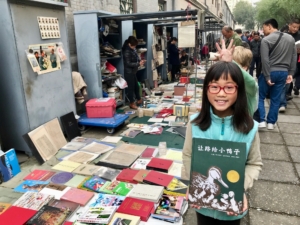
Finding favorite books at a market in Beijing
Can anyone do this?
You may not know this, but as a parent in the United States, you have the right to withdraw your child from traditional school and choose an alternative means to educate them. Some districts now have fully online options that you can do from anywhere. In most states, you will need to register your kids as homeschoolers. In some cases, you will need to record what you teach and how you teach it. But then you get to watch the magic unfold. What happens when your concept of education expands beyond the four walls of a classroom? What happens when you notice learning opportunities can be anywhere at any time? The world becomes your school.
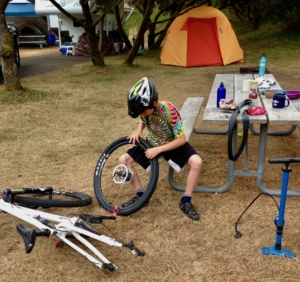
Changing his own flat on the Oregon coast
Won’t my kids fall behind if they don’t go to school?
By rolling into worldschooling, you are choosing to step forward and align yourself with the forefront of innovative educational models. Public and private schools are recognizing the value of travel as part of education. International Baccalaureate (IB) programs promote “intercultural understanding and respect…as an essential part of life in the 21st Century.” Leading universities encourage study abroad programs. Some people may say worldschooling lacks academic rigor, but the evidence will be clear when your kids return to traditional school from a Wonder Year with grit, confidence, and a global frame of reference.
What are some terms used in the worldschooling community?
- Homeschooling: learning at home rather than at a public or private institution
- Worldschooling: learning through direct interaction with the world
- Roadschooling: a form of worldschooling that most often refers to domestic travel
- Nature schooling: using the natural world as the primary classroom; sometimes called forest schooling
- Gameschooling: a form of homeschooling that teaches concepts and skills through games like chess, cards, board games, and manipulative toys like Rubik’s Cubes
- Unschooling: using students’ curiosities and interests instead of prescribed curricula to drive self-paced learning (more on this soon)
- Hybrid schooling: anything goes! a blend of any of the above
We hope these definitions and context help you enter the conversation and community. For a peek at what worldschooling can look like, check out our Fernweh Families posts in this blog. We hope they help inspire your own journey!


